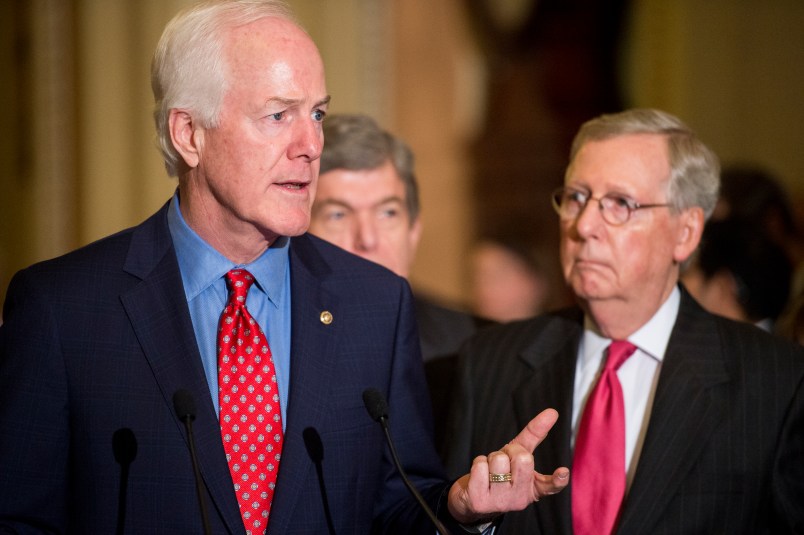The Republican-controlled Senate is moving forward with plans to cut off funding to Planned Parenthood and gut Obamacare despite a deadly shooting at a Planned Parenthood in Colorado Springs that left three dead and nine injured.
“It’s not like it’s new around here,” the Senate’s No. 3 Republican John Thune told reporters late Monday when asked how the shooting may change the political calculus. “It’s a vote we expected to have.”
The optics, however, have shifted for the Republican Party. The vote to partially defund Planned Parenthood was initially intended to be a statement against the sting videos alleging the women’s health clinic was selling fetal tissue. Now, it’s a tragic shooting that voters are connecting with Planned Parenthood. Voting to defund it will serve as a definitive statement of just where the GOP stands on women’s health care as it heads into the presidential election season.
Political messaging is the only thing at stake. The measures to defund Planned Parenthood and weaken Obamacare are sure to be vetoed by President Obama. The value of the defunding fight for Republicans in Congress comes in placating a base that is frustrated with how little of the conservative agenda the GOP-controlled Congress has accomplished in its first year. It also previews for conservative voters what could be if they elect a Republican president and an even stronger Republican Senate majority in the 2016 elections.
The House voted 240 to 189 on a similar budget reconciliation package in October. Senate Republicans lack enough votes to overcome a Democratic filibuster. To get the package through the Senate, they are using the so-called “reconciliation” process – a maneuver that only requires 51 votes to pass.
The Senate’s plan promises to be even more robust in an effort to attract the support of Republican presidential contenders Texas Sen. Ted Cruz and Florida Sen. Marco Rubio who had both expressed concern that earlier versions of the bill had not reached far enough to repeal Obamacare. Sen. Mike Lee (R-UT) also had reservations. The Senate’s plan would gradually phase out Medicaid expansion, with the hope that it is just enough of a sweetener to get reluctant conservatives on board. There are only 54 Republicans in the Senate, giving Republican leaders little wiggle room to loose either moderates or conservatives on the reconciliation bill.
According to a report in Politico, during a closed-door meeting Monday night, some Republicans from states that had expanded Medicaid expressed reservations about what their voters back home would think if they rolled back insurance coverage for the poor. They were assured by leaders that the bill was going to be vetoed anyway so there was no reason to harbor real worries about the political repercussions.
So there you have it. Even if Republican Senate leaders hold the conference together for the vote, reconciliation is a nothing burger going nowhere. President Obama will veto any attempts to redirect funding from Planned Parenthood to other community health clinics and he is not about to watch his landmark legislative achievement crumble in the last year of his presidency.
In the background, there is more pressing business to attend to. After the messaging drama in the Senate this week, the Senate and House will have to actually move to pass an omnibus spending bill to keep the government funded.
It seems unlikely, but not impossible that House Republicans may try to force Planned Parenthood defunding into the omnibus bill and precipitate a government shutdown fight. When asked about that possibility Monday, House Majority Leader Kevin McCarthy told reporters, “I think security is becoming the top issue … especially in the last two weeks.” According to the Huffington Post, McCarthy seemed more open to the possibility of injecting a rider into the omnibus that made the refugee screening process for Syrians much tougher. The deadline for the omnibus is Dec. 11. However, leaders are already warning they may need to pass another shorter stopgap funding bill to give them time to work out the details, moving the deadline to Dec. 18.
This week’s fireworks on reconciliation are merely the Republican Party’s attempt to make good on a promise they made to constituents on the campaign trail that they would take every opportunity they could to take down Obamacare. The real drama will happen when members of Congress race to finish a spending bill before departing for the holidays.
Correction: Sen. Mike Lee represents Utah of course, not Idaho, as the original version of piece mistakenly stated.









